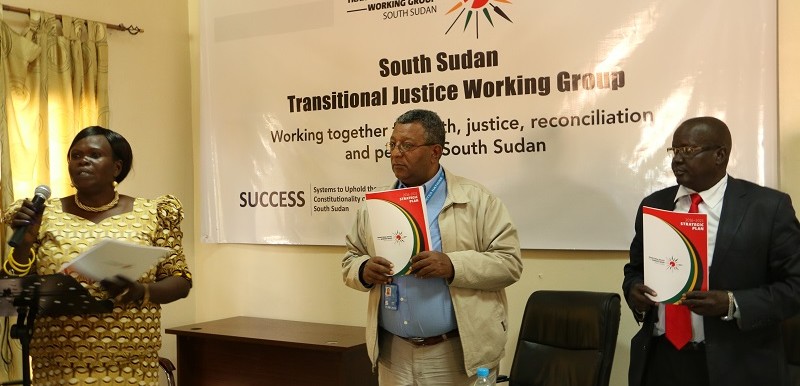The Transitional Justice Working Group (TJWG) – a coalition of civil society organisations engaged in transitional justice initiatives – launched their five-year strategic plan in Juba, South Sudan. Opening the ceremony, Reverend James Ninrew, Acting Coordinator of the TWJG and Executive Director of Assistance Mission for Africa (AMA), invited civil society to “join forces for the benefit of truth, justice, reconciliation and healing in South Sudan.” Presenting the TJWG to the audience, Jame David Kolok, TJWG member and Executive Director of Foundation for Democracy and Accountable Governance (FODAG), explained that “work on transitional justice had already started before the signing of the peace agreement in August 2015.”
Indeed, the conversations about transitional justice amongst civil society commenced at a conference in November 2014. The conversation was taken a step further when, in September 2015, over 30 representatives of civil society organizations convened in Juba to discuss the formation of a civil society transitional justice working group. The meeting was organized by Dialogue and Research Initiative (DRI) and the Human Rights Development Organization (HURIDO) and was supported by the Public International Law Policy Group (PILPG) of the SUCCESS Consortium and UNDP’s Access to Justice and Rule of Law Project. After a series of meetings, this resulted in the formation of the Transitional Justice Working Group. Between February and May 2016, the TJWG developed a 5-year strategic plan that aims to enable civil society to play an essential role in the effective implementation of processes for truth, justice, reconciliation and healing in South Sudan. On 12 December, the TJWG officially presented itself to the South Sudanese public and launched their strategic plan.
Presenting the key components of the strategic plan, Paleki Obur, TJWG member and Executive Director of the South Sudan Women Empowerment Network (SSWEN), presented the group’s vision of “inclusive and victim-centred transitional justice processes in South Sudan.”
Highlighting the TJWG’s guiding principles, she explained that the “TJWG strives for a South Sudanese-driven transitional justice process that pays particular attention to the needs of women and girls.” The TJWG aims to promote truth, justice, reconciliation and healing; to increase understanding about the transitional justice process; to coordinate civil society support to the transitional justice mechanisms in the peace agreement; and to support victims and other persons affected by the conflict to have their voices heard.
Addressing the TJWG and speaking on behalf of the United Nations Development Programme (UNDP), Senior Programme Advisor Lealem Berhanu Dinku applauded the TJWG for coming this far and noted that “the path on which you have embarked is not for the faint-hearted. It is an undertaking that requires much thought and long-term thinking, in a setting that is characterised by dynamic and frequent changes.” He continued by pledging “UNDP’s undivided support for the TJWG, for it is a competent group with a shared interest and vision to work together for reconciliation, truth, justice and peace in South Sudan.” He urged the representatives of the donor community, United Nations agencies and government institutions in the audience to do the same.
Representing the Ministry of Justice and Constitutional Affairs (MoJCA), Honourable Filberto Mayuot Mareng, Prosecutor General, said that the “role of civil society is crucial under the peace agreement. They are representatives of victims and transitional justice must become the property of South Sudanese society.”
In her keynote speech, the guest of honour, Honourable Esther Ikere, Undersecretary of the Ministry of Gender, Child and Social Welfare, proclaimed that “in seeking transitional justice and accountability, we need to re-establish the rule of law. Reconciliation is meaningless without accountability. It is a long journey, but we need ownership, commitment and dedication. We need to take responsibility as South Sudanese. We need to create spaces for victims of sexual violence to come out and speak. This is why the Commission for Truth, Reconciliation and Healing is important.” She highlighted the fact that civil society has a duty to explain transitional justice to the people at the grassroots level, especially having regard to the South Sudanese context. She further noted that civil society is positioned to provide easy understanding of the peace agreement to the people, thereby ensuring national ownership. After the keynote speech, Honourable Esther Ikere, officially launched the strategic plan.




